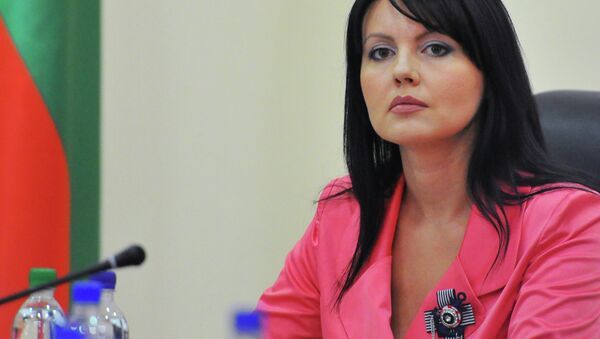The Minister of Foreign Affairs of the unrecognized republic of Transnistria, Nina Shtanski, gave an exclusive interview to information agency Rossiya Segodnya on Thursday, where she supported the position of the Russian Foreign Ministry on how the current peacekeeping mission should be maintained in the conflict zone, and explained why recent proposals for the mission’s reform will do nothing to resolve the conflict.
Ms. Shtanski, today the Department of Information and Press of the Russian Foreign Ministry issued a statement that a change in the current format of the peacekeeping mission there was unacceptable, including the presence of Russian peacekeeping forces. What is Transnistria’s position on the issue?
Nina Shtanski: Transnistria has consistently held the position that any change to the present format is inadmissible; the mission is unique in its level of effectiveness in its peacekeeping operation on the Dniester [River].
The peacekeeping mission has been in place for over twenty years, and its main result has been an effective separation of the conflicting sides, and the maintenance of peace and stability on the Dniester [River]. The stabilizing role of the present peacekeeping mission, led by Russia, is invaluable. The joint peacekeeping forces enjoy the unconditional trust of the population.
Recently there have been statements that the time has come to give the peacekeeping force on the Dniester an internationalized, civil nature, in order to create the conditions for conflict settlement and rapprochement. What do you think about this?
Nina Shtanski: There really are a lot of statements of this kind. Sometimes it seems that some Moldovan representatives are carrying out a sort of “quantitative standard” on someone’s orders. The absence of armed clashes and the relatively-well controlled situation in the security zone is the direct result of the established and functional system of peacekeeping, individual elements of which mutually reinforce one another.
I do not think that our partners in Moldova have forgotten that a mission of civilian observers had already been created once on the banks of the Dniester in 1992. At that time, three of the four delegations of participants of the quadrilateral mission –from Moldova, Ukraine and Romania (the Russians were the exception) very hurriedly left the Transnistrian city of Bender shortly before the beginning of armed clashes; they were only concerned for their own safety. They simply fled. It wasn’t possible then to avoid bloodshed from the armed aggression initiated by the Moldovan side. Hundreds of civilians died then, including children. Then Russia stopped the bloodshed; it separated the conflicting parties, initiated the creation of the peacekeeping mission, and seated the two sides at the negotiating table.
In Transnistria people remember these “lessons of history” well and today, as before, they greatly appreciate Russia’s balanced and responsible approach to the functioning of the peacekeeping mission on the Dniester.
Why, in this case, do a number of Western countries and organizations hold a different opinion, and why has criticism of the peacekeeping operation intensified so much in recent months?
Nina Shtanski: It’s obvious that the purpose of such statements and actions is to generate [misinformation about] the peacekeeping mission, which naturally does not contribute to the settlement of the conflict between Transnistria and Moldova. It is difficult for us to comprehend the irritation of some countries toward the presence of well-trained and prepared Russian peacekeepers in this region of Europe. After all, this presence is the key factor preventing the “unfreezing” of the conflict.
Events such as the Brussels round table, where for the third time this year a fairly biased study was presented by two experts known for their prejudicial attitude toward Transnistria, hardly have any practical use. At one time I had also participated in such a group of experts, and in this regard I can confirm that the practice of discussing reports which were first presented and discussed in various countries in April and May now, in October, is, to put it mildly, very peculiar. In fact, it is a rather unprofessional imitation of one and the same story. The publication of an outdated report by Moldovan and Romanian experts is [simply] being presented again and again through round tables in the capitals of the parties to the “Permanent Conference” [the Permanent Conference on Political Issues Within the Negotiation Process Toward a Transnistrian Settlement].
In Transnistria there is hope that experts will apply their experience and knowledge to develop concrete proposals and recommendations on the issues of concern, and not to make their own ‘contribution’ to the destruction of the few effective platforms of interaction between the parties.
Recent statements by Ion Stevile, Moldova’s Ambassador to Ukraine, who believes that the ongoing peacekeeping mission in Transnistria does not correspond to certain “generally accepted international standards” are surprising. We do not have any desire to comment on these kinds of statements, and I will limit myself to reminding everyone that twenty years ago, Russia did make an attempt to internationalize the peace process on the Dniester, addressing the OSCE and the United Nations, but was turned down.



